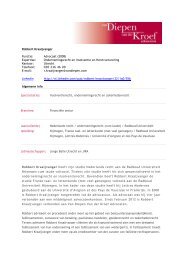© Van Diepen Van der Kroef Advocaten
© Van Diepen Van der Kroef Advocaten
© Van Diepen Van der Kroef Advocaten
- No tags were found...
Create successful ePaper yourself
Turn your PDF publications into a flip-book with our unique Google optimized e-Paper software.
Association et al. will below further address the absence of an alternative effective legalremedy in this case.192. The District Court correctly recognised that according to the judgment of the EuropeanCourt of Human Rights states may not evade their obligations un<strong>der</strong> the ECHR bytransferring powers to international organisations. The District Court did not refer to anyparticular legal consi<strong>der</strong>ation and it is very much the question whether that decision can betraced back to the cited judgment of the European Court of Human Rights. This evasion ofobligations un<strong>der</strong> the ECHR is precisely what is happening in this case; the State of theNetherlands will not co-operate and refers to the United Nations. Then the State of theNetherlands asserts that the party it has refered to may not be sued on the ground ofimmunity. The District Court should never have followed that line of reasoning. The DistrictCourt goes on to say that the ECHR ‘appears’ to adopt the position that immunities ofinternational organisations are only reconcilable with Article 6 ECHR if a reasonablealternative remedy for protection of ECHR rights exists with the international organisationconcerned. By using the word ‘appears’ the District Court manifests an erroneous legalconsi<strong>der</strong>ation. The judgment of the European Court of Human Rights gives no cause toassume that the European Court of Human Rights has intended anything other than what wasexpressed in the judgment. The extension of the holding by the District Court should havebeen that the immunity of the United Nations in the present case is not reconcilable withArticle 6 ECHR and that the United Nations offered no reasonable alternative remedy for theprotection of the ECHR rights. After all, there has been no implementation of Section 29 ofthe Convention (for more than 60 years already). The District Court did not even addressSection 29 in this framework, which it should have done.193. At first instance and above the Association et al. has referred to the caselaw of the HogeRaad (highest court in the Netherlands). Where an alternative and effective legal remedy isabsent, the immunity of the international organisation should yield to the interests of theplaintiff (20 December 1985, NJ 1986, 438 (Spanish/Iran-United States Claims Tribunal). Inthat case it was further expressly held that the fact that the disputed conduct fell un<strong>der</strong> thefunctional immunity posed no obstacle to the weighing of interests referred to above (seelegal consi<strong>der</strong>ation 3.3.5). Immunity was accorded in that case only because theinternational organisation in question provided an alternative and effective legal remedy(see legal consi<strong>der</strong>ation 3.3.6). In the judgment of the District Court The Hague, 28November 2001, NJkort 2002, 1, the Court also held that it had jurisdiction to hear the case<strong>©</strong> <strong>Van</strong> <strong>Diepen</strong> <strong>Van</strong> <strong>der</strong> <strong>Kroef</strong> <strong>Advocaten</strong> page 82 of 99
















